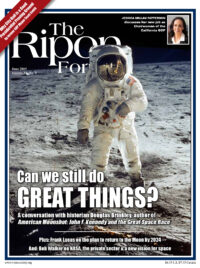
In 1969, driven by curiosity, ambition, and an innate urge to explore, Americans landed on the Moon. Doing so at the height of the Cold War helped establish our country’s technological supremacy and gave us a fundamental edge over the Soviet Union.
Today, our reasons for returning to the Moon are even stronger than they were fifty years ago. Going back to the Moon isn’t a symbolic effort: we need an American presence there to keep us at the forefront of technological development, to identify and manage lunar resources, and to power our missions to Mars.
The technological innovations that come from human exploration of the Moon have direct practical applications here on Earth. Technology developed by NASA is now used in everything from infant formula to cell phones. We have precise robotic surgical capabilities and safer flights from deicing chemicals because of NASA innovations. Developing the technology necessary to establish a human presence on the Moon will have untold applications in the future. Direct study is also critical from a purely scientific perspective. The Moon can give us a wealth of information about our Sun, our Solar System, and our planet, giving us a better idea of our place in the universe.
Going back to the Moon isn’t a symbolic effort: we need an American presence there to keep us at the forefront of technological development, to identify and manage lunar resources, and to power our missions to Mars.
The Moon also has exciting potential resources. Mining rare earth elements and platinum group metals can provide valuable commercial development. Helium-3 could be used to power nuclear fusion reactors, fueling clean energy development. And creating the technology to explore and extract the Moon’s resources can help us learn how to extract resources from asteroids.
Perhaps the most valuable resource on the Moon, however, is water ice. Lunar ice can help us replenish oxygen and create rocket fuel that propels us to Mars. The two elements that make up water can be separated and converted to rocket fuel’s basic components: liquid hydrogen and liquid oxygen. Using the Moon as a refueling station allows us to launch from Earth without being weighed down by all the fuel needed for the entire Mars journey.
Lunar ice is just one of many reasons that our ambition to visit Mars and travel deeper into space requires us to first return to the Moon. It will give us the ability to develop and test technology, life-support, radiation protection, communications, and propulsion systems to safely send humans to Mars.
With all these benefits, the question isn’t whether humans will return to the Moon; the question is whether the United States will lead in that effort. We’re facing increased international competition and we can no longer take American leadership in space for granted. China has been vocal about plans to establish a human base on the moon. Unlike the U.S., which has a civilian agency overseeing space exploration, China’s program is managed by the People’s Liberation Army. There are very real reasons to be concerned about China having an advantage over the U.S. from the technological innovations and resource development that will come from returning to the Moon.
President Trump and Vice President Pence recognize the urgent need for American leadership in space and have set an ambitious challenge to land on the Moon by 2024 as part of a broader effort to increase human space exploration.
Returning to the Moon won’t be easy, however. We are in the process of developing the technological capabilities we will need. Reaching the Moon requires rockets far more powerful than those used to reach the International Space Station (ISS). The Space Launch System (SLS) will be the most powerful rocket built. In concert with the Orion spacecraft, a state-of-the-art crew capsule, SLS will allow us to travel to the Moon and, eventually, beyond.
President Trump and Vice President Pence recognize the urgent need for American leadership in space and have set an ambitious challenge to land on the Moon by 2024.
We also need to make progress on new technologies which aren’t yet fully funded or developed. The space suits we currently use for extravehicular activity outside the ISS do not have the capabilities required for use on the Moon. We need to engineer new suits that are compatible with multiple mission requirements. And, of course, we need lunar landers capable of carrying humans. NASA is working with commercial partners to develop these vehicles.
Beyond the technological innovation, however, a return to the Moon requires steadfast and consistent support. It requires a true national commitment—one that doesn’t change year after year, or with political swings. For too long U.S. space exploration has been plagued by a lack of both a vision and a long-term commitment to see ideas through to execution.
I believe we now have most of the pieces in place to make a return to the Moon possible. Our President and Vice President have a bold and inspiring plan. My colleagues in Congress, on both sides of the aisle, are eager to support this goal. NASA has proposed an initial plan that is budget neutral and technically feasible and gives NASA the down payment to send Americans to the Moon by 2024 without jeopardizing other critical missions.
We have the vision, we have the commitment, and we have the logistics in place. Our task is to stay the course and work together to make both the initial and long-term investments necessary to send American astronauts to the Moon and ultimately Mars.
Frank Lucas represents the 3rd District of Oklahoma in the U.S. House of Representatives. He serves as the Ranking Member of the House Science, Space, and Technology Committee.




